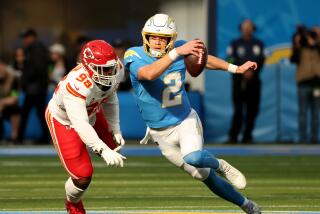Chrysler Drives Ahead as U.S. Sales Rebound
- Share via
Dieter Zetsche is Chrysler’s comeback kid.
Two years ago, DaimlerChrysler dispatched a cadre of former Mercedes-Benz executives to its Chrysler Group, which had been struggling. Zetsche, 51, headed the turnaround team as the U.S. unit’s chief executive. He pressed employees to boost productivity and suppliers to slash prices, and told anyone who would listen that exciting vehicles would be the carmaker’s salvation.
Sure enough, Chrysler recently posted an operating profit of nearly $1 billion for the first half of fiscal 2004 with the help of a rejuvenated product lineup. Among the hot sellers: the new Chrysler 300 luxury sedan and its sporty wagon version, the Dodge Magnum; both cars offer an 8-cylinder, 340-horsepower Hemi engine that has lured new buyers. The popularity of the new cars helped nudge up Chrysler’s monthly sales 1% in August, while most rival automakers suffered sales declines.
What’s next? Zetsche looked ahead during a break at a company event in Santa Barbara.
Question: Chrysler Group has returned to profitability and your U.S. market share is holding steady at 14.5%, but many analysts believe in the next few years that Toyota will overtake Chrysler. Does that concern you?
Answer: I don’t expect it to happen, but it doesn’t bother me if it would. The largest company is not necessarily the most profitable. We are more focused on our own development rather than our position relative to anyone else.
Q: What is the company’s strategy for the U.S. market?
A: We will launch 25 new products [for the Chrysler, Dodge and Jeep brands] over the next three model years, including nine new ones this year. It’s not just about the number of new products, though. It’s about consumer excitement, and that’s where we are focusing more.
Q: But hasn’t Chrysler been hurt by its mixed reputation for product quality?
A: We are seeing significant improvements on the quality side and we are closing the gap very fast [with our rivals]. Our goal is that no later than the 2007 model year we want to be even with the very best in quality.
Q: Part of Chrysler’s strategy seems to be that bigger and more powerful is better. You advertise powerful Hemi V8 engines instead of pushing the most-economical models you sell. How do you justify this when many consumers are worried about higher gas prices and our dependence on imported oil?
A: I don’t think we should try to mandate what the customer chooses. What we should do is to optimize the fuel consumption in every vehicle, in every segment. We offer a cylinder shut-off system with the Hemi engine [which shuts down four of the eight cylinders at cruising speeds]. And we are being very aggressive on the car side. More than half the new products we are doing in the next three years are based on car platforms, whereas today almost 75% of our production is on the [less-fuel-efficient] truck side.
Q: There’s an effort by some in government, and certainly within environmental circles, to push for smaller cars. Do you see the market shifting?
A: I don’t think we can or should force dramatic changes in our auto products. Is anyone discussing that Americans should live in smaller homes, or take the air conditioner temperature up in the summer to 78 degrees? Look at the average American city and the average Japanese or European city. There is much more space in the American city. People spend much more time in their vehicles here because there is very little mass transportation. These are significant differences which make people ask for very different products.
Q: California wants to regulate greenhouse gases, particularly the carbon dioxide created in the burning of fossil fuels such as gasoline. What’s Chrysler’s position?
A: There is an automotive industry position, and we are very much unified. [The] regulation of CO2 is nothing but regulation of fuel consumption and this is within the federal domain to regulate, not the state’s.
Q: Chrysler seems intent on pushing for acceptance of diesel engines. Although diesels produce less CO2 than gas-powered engines, diesel passenger cars can’t be sold in California because of our strict emissions rules. And federal emissions rules for diesels will get tougher in 2007. So, how long can Chrysler offer vehicles like the diesel Jeep Liberty model you’re bringing out later this year?
A: It is amazing what engineers can still do to improve engines. I’m relatively optimistic we will be able to meet those [diesel] standards, the main question is at what cost? But we are doing all we can to make it happen.
More to Read
Inside the business of entertainment
The Wide Shot brings you news, analysis and insights on everything from streaming wars to production — and what it all means for the future.
You may occasionally receive promotional content from the Los Angeles Times.










